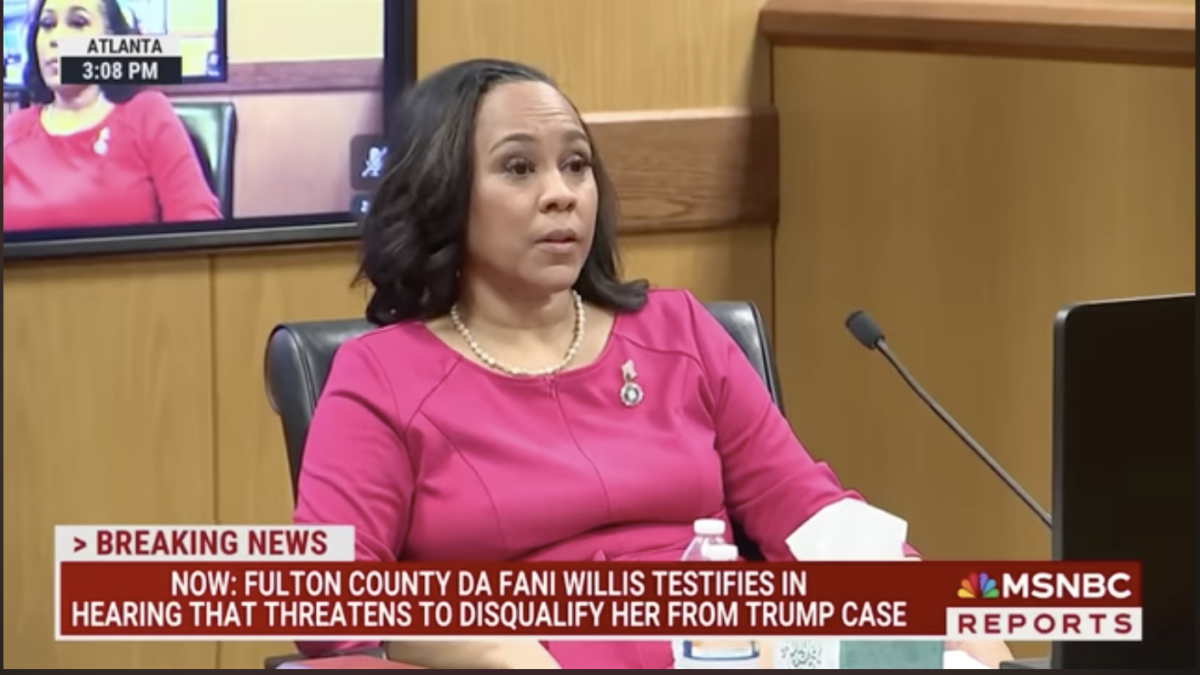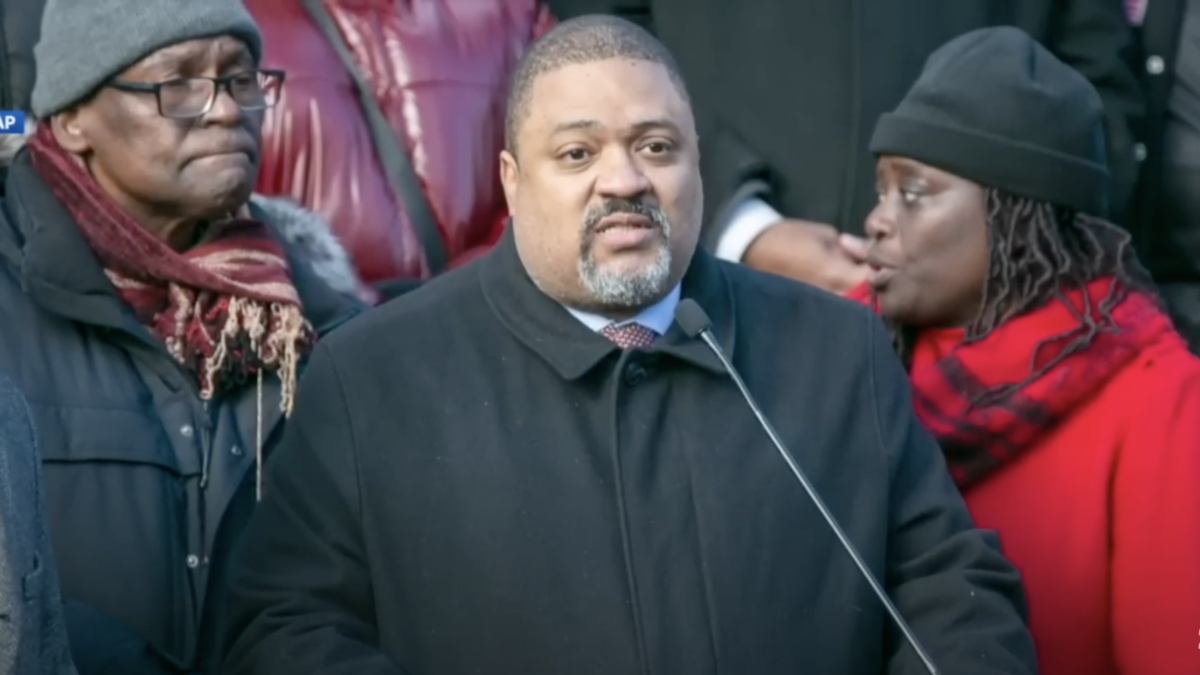Fulton County Judge Scott McAfee found District Attorney Fani Willis potentially lied, cast “racial aspersions” on a defendant, and had a “tremendous lapse in judgement,” but could nonetheless continue her crusade targeting a former president — so long as special prosecutor Nathan Wade withdraws from the case.
McAfee issued a decision Friday saying the defendants “failed to meet their burden of proving that the District Attorney acquired an actual conflict of interest in this case.”
Former President Donald Trump, along with Michael Roman and other co-defendants, argued that Willis had disqualified herself from prosecuting them on racketeering “RICO” charges ostensibly relating to the 2020 election. One of the reasons Roman, who filed the original motion to dismiss, gave for Willis’ disqualification was that she had allegedly financially benefited after she hired her lover Nathan Wade as special prosecutor on the case. Wade allegedly took Willis on vacations using the money he earned while on the case.
Wade’s law firm was paid more than $650,000 for his involvement over a two year span, far more than the other special prosecutors on the case. The law firms of Anna Cross and John Floyd were each paid less than $100,000, according to 11 Alive.
The money, defendants alleged, was used to treat Willis to lavish vacations to the Bahamas, Aruba, Belize, and Napa Valley, which Willis claims she repaid in cash.
McAfee ruled that Willis’ “reimbursement practice” — allegedly carrying cold, hard cash on hand at all times in the thousands — “may be unusual and the lack of any documentary corroboration understandably concerning.”
Still, McAfee said he believed the evidence presented “did not establish [Willis’] receipt of a material financial benefit as a result of her decision to hire and engage in a romantic relationship with Wade.”
Willis and Wade further denied allegations that their romantic relationship began prior to Wade’s appointment — which would presumably create a clear conflict of interest in Wade’s hiring. Cellphone data submitted by the defense purportedly shows Wade made “at least 35 visits to the Hapeville neighborhood where Fani Willis was living before the district attorney hired him to lead” the prosecution of Trump, according to The Atlanta Journal-Constitution.
Wade testified he visited Willis at her condo a maximum of 10 times prior to being hired in November of 2021.
Willis’ former friend, Robin Bryant-Yeartie, further told the court there was “no doubt” the couple had begun their relationship as early as 2019. Yeartie claimed she witnessed the pair “hugging” and “kissing” that same year.
The judge — who donated $150 to Willis’ campaign in 2020 — ruled the “prosecution is encumbered by an appearance of impropriety.”
“As long as Wade remains on the case, this unnecessary perception will persist,” McAfee ruled.
“Without sufficient evidence that the District Attorney acquired a personal stake in the prosecution, or that her financial arrangements had any impact on the case, the Defendants’ claims of an actual conflict must be denied,” McAfee wrote. “This finding is by no means an indication that the Court condones this tremendous lapse in judgment or the unprofessional manner of the District Attorney’s testimony during the evidentiary hearing.”
Nevertheless, McAfee concluded that “tremendous lapse in judgment” was not enough to disqualify Willis from her highly politicized, unprecedented prosecution of a former president.
“Ultimately, dismissal of the indictment is not the appropriate remedy to adequately dissipate the financial cloud of impropriety and potential untruthfulness found here,” the judge continued. “The District Attorney may choose to step aside, along with the whole of her office, and refer the prosecution to the Prosecuting Attorneys’ Council for reassignment. Alternatively, SADA Wade can withdraw.”
McAfee gave Willis the same treatment President Joe Biden received from special prosecutor Robert Hur: an acknowledgement of near-certain wrongdoing but a reticence to apply any real consequences. McAfee acknowledged that Willis may have “testified untruthfully” about her relationship with Wade but claimed there was not enough evidence to remove Willis entirely, a move my colleague, Eddie Scarry, anticipated days before McAfee’s ruling.
“[McAfee] will likely acknowledge [Willis’] obvious deception of the court, but ultimately conclude it doesn’t change the underlying case against the former president and his associates,” Scarry predicted.
Further, McAfee condemned Willis’ apparent attempt to chalk defendants’ skepticism of her relationship with Wade up to racism. Still, the judge stopped short of saying her action warranted recourse. Willis alleged during a speech at an Atlanta church in January that Republicans were “playing the race card,” rather than raising legitimate concerns about the impropriety of Wade’s involvement in the case.
“I am a little confused. I appointed three special counsel, which is my right to do. Paid them all the same hourly rate. They only attack one,” Willis said, according to The Washington Post.
McAfee admitted the speech was “legally improper” and had the “effect [of] cast[ing] racial aspersions at an indicted Defendant’s decision to file this pretrial motion,” but nevertheless denied defendants’ motion to dismiss Willis on such grounds.
Tea Party Patriots Action Honorary Chairman Jenny Beth Martin issued a scathing rebuke of McAfee’s ruling.
“It is clear to any fair-minded person that Fani Willis disqualified herself by hiring her lover to lead the Trump prosecution, abusing government funds, and then engaging in perjury and obstruction of justice during her hearing,” Martin said.
Others highlighted the likelihood that the Trump defense team will cite what McAfee noted was a “cloud of impropriety” surrounding Willis’ case on appeal.
“Judge McAfee’s ruling vindicates the defendant’s motion to recuse. Willis’ conduct and testimony during these pretrial hearings do not instill confidence in the process, much less her judgment,” said Heritage Foundation senior legal fellows Hans von Spakovsky and Charles Stimson in a statement. “If she refuses to do the right thing and stays on the cases, and there are any convictions, these issues will be front and center on appeal and call into question the integrity of those convictions.”








